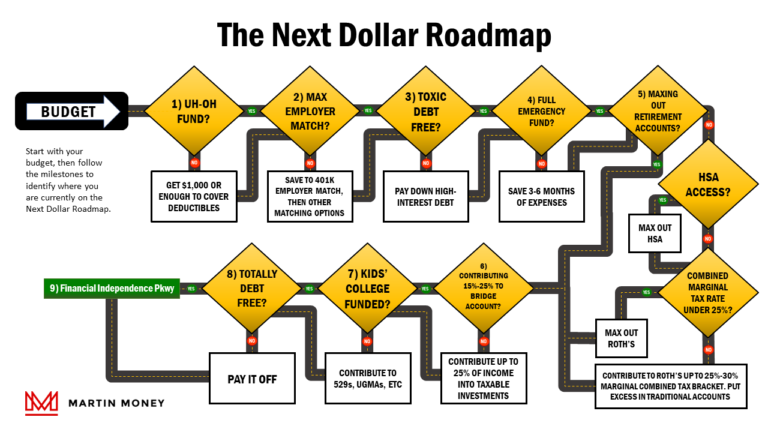Should I Pay Off My Mortgage Early? 4 Factors to Consider
The decision to pay off your mortgage early is dependent on a number of factors like your age, the interest rate, and other financial goals that should all be considered in order to make the best decision.
When we were designing the order of each financial event the Next Dollar Roadmap, there were a few milestones that gave me a bit of heartburn.
It’s not that we felt like any part of the plan was flawed, but I was worried about making suggestions in a generalized plan that may not be perfect for each situation.
For example, I am confident that, most of the time, it makes sense to maximize any available employer match before paying off high-interest debt.
But I’m also assuming that, as a percentage, the employer match exceeds the interest rate on any debts a given person may have.
Since most employer match payments are made on a dollar-for-dollar basis (i.e. 100%), this is a reasonably safe bet.
But then, in a moment of reflection, I would run through the “what ifs”.
- What if it’s a profit-sharing plan and there aren’t many profits to share in a given year?
- What if the employer match is only 10% or 15%?
- What if the employer gives some sort of a match, but the plan stinks because the investment choices are limited and have high expenses?
- What if the lender is an absolute basket-case and is making someone’s life miserable as they engage in a campaign to recover their loan balance?
Hence, we try to make it clear that everything we write is dependent upon individual circumstances.
We ran into the same issues for Milestone 8: Pay Off Remaining Debt.
Should I Pay Off My Mortgage Early?
There could be other low-interest debts in Milestone 8, but almost all debt remaining at this point in a financial journey will be in the form of a mortgage (if you’re following the roadmap or something similar).
Years ago, this was a bit of a no-brainer.
If you were otherwise financially secure (i.e. no debt, adequate emergency and retirement funds) it was hard to make a case for paying interest on an asset you can own outright.
Then, the federal reserve began lowering interest rates after the Great Recession and kept them low for well over a decade.
By the end of 2020, a 30-year mortgage could be had for an average of 2.67%.
Naturally, with mortgage interest rates so low, people began to question the wisdom of paying off such “cheap” debt early.
After all, if you have a mortgage at 3% or lower and your stocks are far outperforming such a paltry rate, wouldn’t it be a little penny-wise and pound-foolish to pay it off instead of investing those early payments?
Admittedly, I’d have a difficult time making a case against it.
Alas, my heartburn when I wrote Milestone 8. One size does not fit all. And, in this case, one size was fitting for fewer and fewer people.
Well, that’s changing again.
On the day I’m writing this post, the average 30-year mortgage will come with a 6.9% interest rate: a far cry from 2.67%.
It seems we are trying to hit a moving target.
Additionally, there are other factors that should go into a decision to pay off your mortgage early like your age, other demands for your available cash, other goals, the risk-free rate of return, and so on.
In this post, we’ll take a deeper look at this issue and hopefully provide some insight you can use to navigate this decision yourself.
As you read this, keep in mind that I am assuming you are already beyond steps one through seven on the Next Dollar Roadmap. If you don’t have sufficient savings for retirement or emergencies, or you have other debts, you may need to backtrack a bit before weighing your options on Milestone 8.
1) Your Mortgage Interest Rate vs Your Potential Investment Returns
The math for this decision is relatively simple at any given moment in time.
If you can earn a rate of return on the money you invest that exceeds the amount of interest you are paying on your mortgage, it will be financially advantageous to invest instead of paying off your mortgage.
If the interest rate on your mortgage is higher than the rate of return you will receive for investing, then you should pay off your mortgage.
For example, the interest rate on my mortgage is 3.5%. A 30-year treasury bond is currently yielding 4.262%.
If I took a lump sum equal to the remaining balance on my mortgage and invested it in a 30-year T-bond, I would receive a 0.762% higher rate of return for that money.
Seems easy, right?
The problem is returns for investments change constantly; even for near zero-risk assets like treasuries.
And, if you primarily invest in stock-based securities then you probably know that there is an even higher degree of variability in their returns.
So, what to do?
As a suggestion, consider what a U.S. Treasury Bond, Note, or T-Bill would pay in interest for a similar period as that remaining on your mortgage.
The names of treasuries are associated with the term of each issue and there are also differences in how the bonds are paid, but since treasuries are sold in an auction format you will always have a picture of where the financial industry expects interest rates to go for a given period of years from today.
Treasuries are also about as low risk as investments come, so you can use them as a proxy for the risk-free rate of return.
In other words, treasury rates are a great way to preview what the financial sector generally expects interest rates to do over an extended period.
We want to evaluate this against a risk-free rate because the payments would be coming from your personal cash flow and don’t carry any risk from a 3rd party.
If treasuries for a similar period are considerably lower than your current interest rate, you might consider paying off the mortgage.
On the contrary, if you can obtain a superior return for no additional risk then perhaps it makes sense to hang onto the mortgage and invest your excess elsewhere.
But, this is based on one significant assumption…
2) Will You Actually Save It?
If you decide not to pay off the mortgage and invest it instead, you will only achieve a superior financial result if you actually invest the money.
For example, let’s assume you have $1,000 each month that you could apply to your mortgage principle or invest.
You see that a 10-year treasury is paying 1% more annually than your mortgage is costing you, so you decide not to apply it to your mortgage.
This means over 10 years you would come out about $100 better (1% annually x 10 years) for one payment if you invest it in the treasury bond instead.
And here’s the catch.
Many people don’t actually invest the amount they were going to apply toward their mortgage.
This means the $1,000 they diverted earns them $0 more in interest (or worse since they’re still servicing the debt) and they are no better off mathematically.
Truthfully, if you’re on Milestone 8, you probably won’t notice one way or the other, but it must matter to you a little if you have taken the time to read this article.
If you forgo paying off the mortgage, be sure to follow through with the plan completely and invest the extra money.
Otherwise, you might as well just pay off the mortgage, even at the lower interest rate.
3) Why The Investment Asset Matters (how much time you have)
You might have read the previous section and thought, “That risk-free rate stuff is nice, but I’d rather invest in something with better returns than treasuries.”
After all, historically compared to stocks, treasuries do not produce nearly as much interest.
Personally, I couldn’t agree more. Having a low to no-risk option is great, but it’ll take more than a couple hundred basis points from a T-bill to produce meaningful returns for your investments.
And, since you’re at Milestone 8, chances are you already have a brokerage account that is at least somewhat invested in stocks.
In this case, I’d say go ahead and invest the extra funds according to your previously established investment strategy.
The only word of caution I’d have for investing the money in stocks instead of treasuries or another safe cash equivalent is if you have a short-term need for the money.
Since stocks can take a downturn quickly, and stay low for some time, you should avoid investing the money this way if you need it within the next 5 to 7 years.
Again, this is unlikely considering we’re talking about Milestone 8, but it is something to bear in mind.
If you do need the money in less than 5 years, but you have a low-interest mortgage, I’d consider T-Bills, Treasury Notes, or a high-yield savings account.
4) How Close Are You to Retirement?
The final factor for you to consider is how far off you are from retirement.
Personally, I’d suggest that almost everyone try to completely pay off their mortgage before they retire.
The reason is your early retirement years typically present an abundance of tax planning strategies.
When you’re working, you’re realizing earned income and don’t have a lot of control over where your taxable income lands each year.
In retirement, you have a much higher degree of control over your taxable income.
This is especially true if you’re not having to pull money out of an IRA, 401(k), or other tax-deferred account to make mortgage payments each month.
As of March 2023, the average monthly mortgage payment in the United States was $2,317 per month.
That’s $27,804 annually.
That’s $27,804 of realized income that could otherwise be used for Roth conversions, lower Medicare premiums, or just saved and allowed to grow further.
The ultimate point I’m making is that paying off your mortgage before retirement can provide some much-appreciated flexibility as you age.
If the idea of paying off your mortgage early just because you’re retiring in a few years bothers you, you could keep investing and pay off the balance in one whack in the last year you’re working.
Of course, you’ll need to look at how all of this impacts your adjusted gross income to calculate the most optimal way to time your payments.
Just keep it in mind as you approach retirement so you can avoid any regrets by not making plans earlier.
Conclusion
There are many factors to consider when evaluating the merits of paying off one’s mortgage early.
Your financial situation, interest rates, and years to retirement are just some of the things to be considered.
Of course, there’s also the option of hedging your bets and doing a little of both.
The good news is that you’re at a place where you can even ask this question. We hope this information is helpful as you chart out the course of action that’s right for you.







